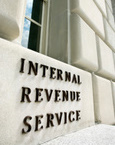The Internal Revenue Service warned authorized electronic filing providers Tuesday that they should not submit electronic tax returns to the IRS before receiving all Forms W-2, W-2G, and 1099-R from taxpayers.

In an email to tax professionals, the IRS said that if taxpayers are unable to secure and provide a correct Form W-2, W-2G, or 1099-R, e-file providers can submit the electronic return only after securing Form 4852, Substitute for Form W-2, Wage and Tax Statement, or Form 1099-R, Insurance Contracts, Distributions From Pensions, Annuities, Retirement or Profit-Sharing Plans, IRAs, etc., in accordance with the use of that form.
“This is the only time providers should submit an electronic return with information from pay stubs or Leave and Earning Statements,” said the IRS.
The IRS also said it may conduct monitoring visits to ensure compliance with Revenue Procedure 2007-40 and with the IRS e-file rules and requirements included in IRS e-file publications.
The IRS could impose sanctions on tax professionals who do not comply. “The IRS may warn or sanction providers that violate IRS e-file rules and requirements,” said the IRS. “Sanctions may be a written reprimand, suspension or expulsion from participation.”
The IRS noted that additional information on sanctioning is available at IRS.gov in Publication 3112, IRS e-file Application and Participation.
The IRS has been beefing up its efforts to authenticate taxpayers as part of its efforts to combat tax fraud. IRS Commissioner John Koskinen discussed some of the new W-2 matching efforts that the IRS is instituting during a conference call with reporters last week. He was asked by a reporter about moving up the deadlines by which employers are required to submit W-2 information. He noted that Congress will be requiring next tax season for such information to be submitted by January 31.
“We’ve been talking with Congress for the last couple of years about it, and I’m pleased that they did provide that starting next tax season—not this one—employers will be required to provide us W-2 information by the end of January,” said Koskinen. “We’ve been working with some payroll providers and others on a kind of pilot basis to get a reasonable number of W-2’s this year in the January timeframe. Obviously the earlier we get them, the more useful they are to us, in determining whether questionable returns are legitimate or not. If we’ve got suspicious returns—and we had over 4 million of them last year—if we have a matching and good W-2, it allows us to lower the rate of what we call ‘false positives,’ where we’ve got a legitimate taxpayer whose return for other reasons was now in our suspicious pile. So we’ll have some experience this year, but Congress has—and we appreciate it greatly—given us the authority to get those information returns by January 31 of the next filing season. Our pitch we have made to the Congress is that several states for some time now have been getting W-2’s by January 31, so I think that’s why the Congress was comfortable making this change. And we’ve had support from the payroll providers. The major service providers say technologically they can do it, so it will help us significantly next year, but we are already starting down this road this year.”
Eleven states, along with Washington, D.C., and Puerto Rico, now require employers to file both Annual Reconciliations and W-2 forms by January 31 each year, according to the payroll company Paychex. While more states are considering this accelerated due date, the federal government has not adopted the earlier filing for tax year 2015 W-2 forms due in 2016. However, this will change for tax year 2016, with W-2 forms due to the federal government Jan. 31, 2017.